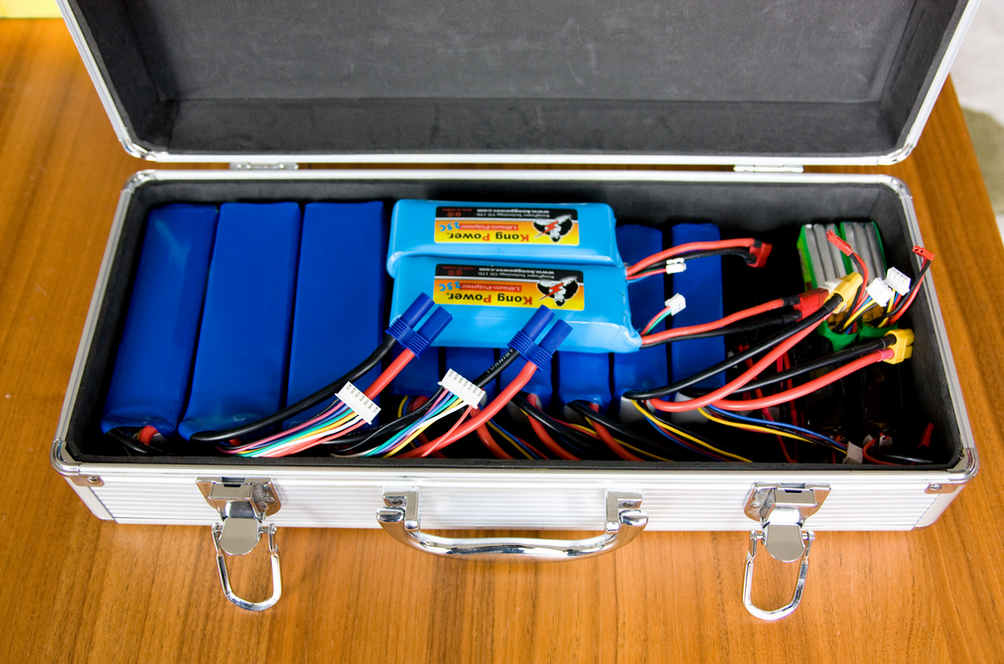Drone enthusiasts and aerial photography fans share a common bond in relying on trusty drone LiPo batteries. These lithium polymer powerhouses are the life force behind the soaring adventures and stunning aerial shots. However, as drone technology continues to evolve, so does the need to address the responsible disposal and recycling of drone LiPo batteries. In this blog, we’ll emphasise the importance of environmentally conscious battery management, offering valuable insights and tips for safely disposing of and recycling these essential components.
Understanding Drone LiPo Batteries
Before we delve into LiPo battery disposal and recycling, let’s briefly recap the significance of LiPo batteries in drones. LiPo batteries are widely favoured for their lightweight design and high energy density, making them an ideal choice for powering drones. They store substantial energy, allowing drones to soar to impressive heights and capture breathtaking aerial images. However, these very attributes, when mishandled at the end of their life cycle, can pose environmental hazards.
Why Responsible Disposal Matters
Like all lithium-based batteries, Drone LiPo batteries contain potentially harmful materials that demand careful disposal. When not disposed of responsibly, these batteries can release hazardous substances like lithium, cobalt, and nickel into the environment, contaminating soil and water sources. It is crucial to adhere to environmentally conscious practices when dealing with drone LiPo batteries.
Tips for Responsible Drone LiPo Battery Disposal
Battery Recycling Programs
Battery recycling programs are pivotal in promoting responsible disposal of drone LiPo batteries. These programs offer a convenient and eco-friendly solution to dispose of old batteries safely. To find a nearby collection point, search online using keywords like “drone LiPo battery recycling near me” or inquire at your local recycling centres. Participating in these programs contributes to environmental sustainability, as they ensure the valuable metals within LiPo batteries, such as lithium, cobalt, and nickel, are recovered and repurposed for future use. This recycling process minimises the need for extensive mining and resource extraction.
Transportation and Storage
Safe transportation and storage of used drone LiPo batteries is essential to prevent accidents, including fires and damage. These specialised bags are designed to contain and suppress fires, reducing the risk of damage or injury during storage and transportation. Safety should be a top priority when dealing with drone LiPo batteries.
Discharge Batteries
You can achieve a safe discharge level by using a battery discharger, a purpose-built device for safely reducing the battery’s charge. Alternatively, you can also achieve this by running the battery in your drone until it reaches the safe voltage level. A fully discharged battery is less likely to pose a fire risk during disposal. Discharging the battery reduces safety risks and helps in the recycling process by making the battery less hazardous to handle.
Local Regulations
Different regions may have specific regulations and guidelines concerning the disposal of lithium batteries, including drone LiPo batteries. It is crucial to familiarise yourself with these local regulations to ensure compliance. Local regulations may dictate how and where to dispose of LiPo batteries and often provide important safety guidelines. Adhering to these regulations contributes to a safer and more sustainable environment while avoiding potential legal issues.
Consult the Manufacturer
Some drone manufacturers and battery suppliers may offer guidance and resources related to properly disposing and recycling of their products. To access this information, check their official websites or contact their customer support services. Manufacturers are often well-versed in the best practices for handling their specific LiPo batteries. They may provide valuable insights, recommendations, or even recycling programs associated with their products. Staying informed and following manufacturer-specific guidance can effectively ensure responsible battery disposal and recycling while benefiting from their expertise.
The Role of Battery Recycling
Recycling old drone LiPo and other RC batteries is not solely about following regulations; it plays a crucial role in conserving valuable resources and mitigating environmental impact. The metals in these batteries, such as lithium, cobalt, and nickel, are finite resources that hold immense importance in modern technology, particularly in producing new batteries. Here’s a closer look at the significance of battery recycling and its far-reaching effects:
- Reducing the Demand for Mining: The mining industry, which extracts raw materials like lithium, cobalt, and nickel, can have a substantial environmental impact. Mining activities can result in deforestation, habitat destruction, soil and water pollution, and greenhouse gas emissions. By recycling RC batteries, we decrease the demand for new mining operations, reducing the ecological footprint of mining activities. This demand reduction encourages the responsible and sustainable management of mining resources.
- Lowering Energy Consumption: Battery production is an energy-intensive process. Mining, refining, and processing raw materials into battery components demand significant energy resources, contributing to greenhouse gas emissions. When we recycle RC batteries and recover metals like lithium and cobalt, we lessen the need for energy-intensive extraction and processing. Consequently, this helps lower the energy consumption of producing new batteries, contributing to a more environmentally friendly and sustainable energy cycle.
- Minimising Environmental Pollution: The extraction and processing of raw materials for battery production can result in environmental pollution, affecting air, water, and soil quality. Battery recycling plays a pivotal role in reducing this pollution. By reusing metals from old batteries, we decrease the need for environmentally harmful extraction methods, helping to mitigate pollution and preserve natural ecosystems.
Drone LiPo batteries available at online store of RC Battery power aerial adventures, but they come with responsibilities. By understanding the importance of responsible disposal and recycling, we can ensure the sustainability of our hobby and safeguard the environment. Whether you’re a drone enthusiast or an environmental advocate, the conscientious management of LiPo batteries is a step toward a cleaner, greener future. So, the next time you retire a tired LiPo battery, remember that recycling is not just a choice; it’s an essential responsibility we all share.


